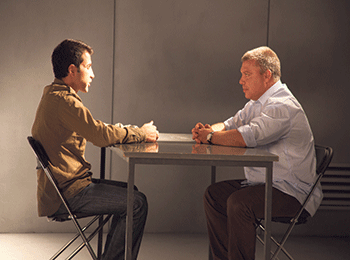With this summer’s war in Gaza still lingering in our memories, it is not surprising that one of the year’s most talked-about documentaries is about the relationship between an Israeli Jew and a Palestinian Arab.
How they became allies and friends, though, is part of the twisty, high-stakes intrigue of The Green Prince, which won an audience award at the Sundance Film Festival in January. The doc comes out in Toronto and Vancouver on Oct. 17 and should expand to other Canadian cities throughout the fall.
The Palestinian is Mosab Hassan Yousef, the son of the top Hamas leader in the West Bank. The Israeli is Gonen Ben Yitzhak, who worked for Israel’s internal security agency, Shin Bet.
Ben Yitzhak relied on Yousef to betray his father and become a secret informant for the agency. He wanted Yousef to infiltrate the upper echelons of Hamas so that Israel could stop terrorist attacks.
Yousef initially hesitates to go rogue, remembering the times the Israeli police would harass and arrest his father. As a boy, Yousef would even vow for revenge against an oppressive regime. “To collaborate with Israel is the most shameful thing you can do in my country,” Yousef explains.
However, after spending time in prison at the age of 17, which exposed him to the political aims of Hamas, he decided to aid Israel. His Shin Bet codename was the Green Prince.
Shin Bet wanted access to the community around Yousef, as he hung out with Israel’s most wanted, including Yasser Arafat. With his proximity to the terror network, Shin Bet could monitor the transactions and terrorist plans of Hamas.
Some in his father’s circle tried to persuade Yousef to join Hamas. He refused. However, the Green Prince also feared that Shin Bet would kill his father, and so the agency had to take extra precaution to keep Yousef’s family safe and secure.
The relationship was built on trust. Ben Yitzhak sometimes abandoned his Shin Bet post to meet with Yousef – a move that went against the agency protocol – to ensure the Palestinian was keeping true to his mission. There was always the chance that working with the enemy could come back to haunt Ben Yitzhak.
Director Nadav Schirman’s documentary is not elaborately cinematic. Much of The Green Prince consists of two talking head interviews, from Yousef and Ben Yitzhak. Filling in the rest is news footages of protests and bombings aftermath, photos of Yousef’s extended family and surveillance from Shin Bet’s cameras.
The security footage is a saturated night-vision green above the twisty roads and small towns near the West Bank border. Max Richter’s sombre score echoes above these images, giving The Green Prince a hollow, unnerving feel that builds suspense.
The Green Prince is adapted from Yousef’s 2010 memoir Son of Hamas but benefits from the gripping, informative to-the-camera address from the subject and his handler.
Some could complain that a sparer approach means The Green Prince is not very cinematic, but more worthy of an hour-long documentary on a show like The Fifth Estate. However, what the film lacks in variety, it makes up for with deeply observed humanity.
To fill for time, Schirman recreates moments from Yousef’s life, such as his time in prison, with other actors. These stylized segments sometimes take Yousef’s point of view as he is held against his will, starting to lose his sense of reality. The fragments of his imprisonment, filled with cavernous noises and blurry vision, are hard to forget.
Even those with a more limited knowledge of Israeli-Palestinian relations since the Oslo Accords should find the timeline easy to follow. Schirman structures the film in chapters, so that we can follow the shifting geopolitical atmosphere with clarity.
Last year, two films about Palestinian informants working for Israeli intelligence earned much acclaim: the Israeli film Bethlehem, and the Oscar-nominated Omar, from Palestine. The Green Prince is like a non-fiction version of those thrillers, although it still manages a few surprises near the end.
By creating so much drama solely from the interviews, Schirman ensures we identify with Yousef and Ben Yitzhak more as people than political pawns. Even though the film mostly consists of two men talking to the camera, it is often gripping and always absorbing.
